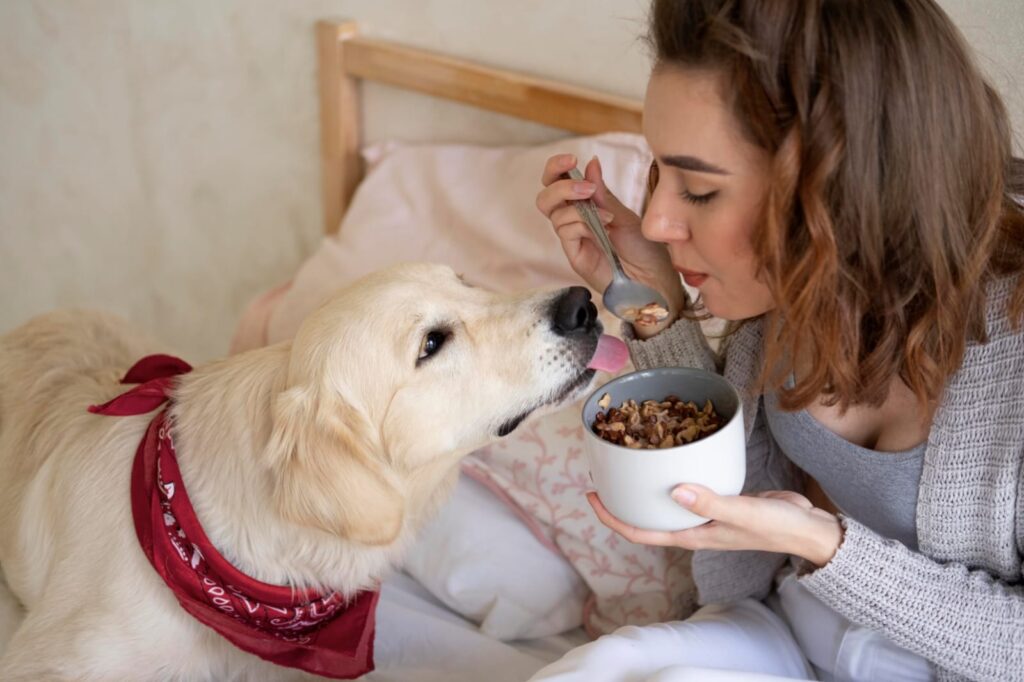Pet Human Food
Introduction:
Our pets hold a special place in our hearts. Their unconditional love and companionship bring immeasurable joy to our lives. Naturally, we want to spoil them rotten, and sometimes that means sharing a bite of our dinner. But before you indulge those puppy dog eyes, it’s important to understand the potential risks and rewards of feeding human food to your pet.

The Case for Caution:
- Different Digestive Systems: Our furry companions have digestive systems designed to process pet food, which is formulated to meet their specific nutritional needs. Human food can be difficult for them to digest, leading to upset stomachs, vomiting, or diarrhea.
- Toxic Treats: Many seemingly harmless foods can be toxic to pets. Chocolate, onions, grapes, and raisins are just a few examples. These foods can cause serious health problems, so it’s crucial to be aware of what’s off-limits.
- Unwanted Weight Gain: Those extra bites from your plate can quickly pack on the pounds for your pet. Obesity can lead to a variety of health issues in pets, including arthritis, diabetes, and heart disease.
- Behavioral Problems: Sharing your food can encourage begging at the table and make it harder to train your pet. They may become persistent in their attempts to score a human snack, and may even resort to stealing food when you’re not looking.

The Potential Perks:
- Nutritional Boost: Certain human foods can provide additional vitamins, minerals, and fiber to your pet’s diet. Lean meats, cooked vegetables like carrots and green beans, and small amounts of plain yogurt can be healthy additions in moderation.
- Training Treats: Small pieces of human food can be a great way to reward good behavior during training sessions. Just be sure to choose healthy options and keep the portions tiny.
- Hydration Helpers: Some fruits and vegetables, like watermelon and cucumber, have high water content, which can be helpful for pets who don’t drink enough water. These can be refreshing treats on a hot day.
- Bonding Time: Preparing and sharing healthy homemade pet treats can be a fun way to connect with your furry friend.

Making Informed Choices:
If you choose to share human food with your pet, do so with caution. Here are some key tips:
- Consult Your Vet: Talk to your veterinarian about what human foods are safe and appropriate for your pet’s individual needs and any pre-existing health conditions.
- Start Small: Introduce new foods in very small quantities to avoid digestive upset.
- Skip the Seasonings: Avoid giving your pet food with added salt, sugar, spices, or fats, as these can be unhealthy for them.
- Plain is Best: Stick to unprocessed, cooked foods whenever possible.
- Know Your Limits: Human food should never be a substitute for a balanced pet diet. Treats should only make up a small portion of your pet’s daily calorie intake.
Never undervalue the significance of routine examinations:
For optimal health, have your pet buddy examined on a regular basis. We at Animal Hospital of Aurora treat your pet with kindness and gentleness. We can help with everything from complex surgical procedures to immunization campaigns.
Remember:
When it comes to your pet’s well-being, it’s always better to err on the side of caution. There are plenty of safe and delicious pet treats available that are formulated to meet their nutritional needs. By understanding the risks and rewards of sharing human food, you can make informed choices that keep your furry friend happy and healthy for years to come.



